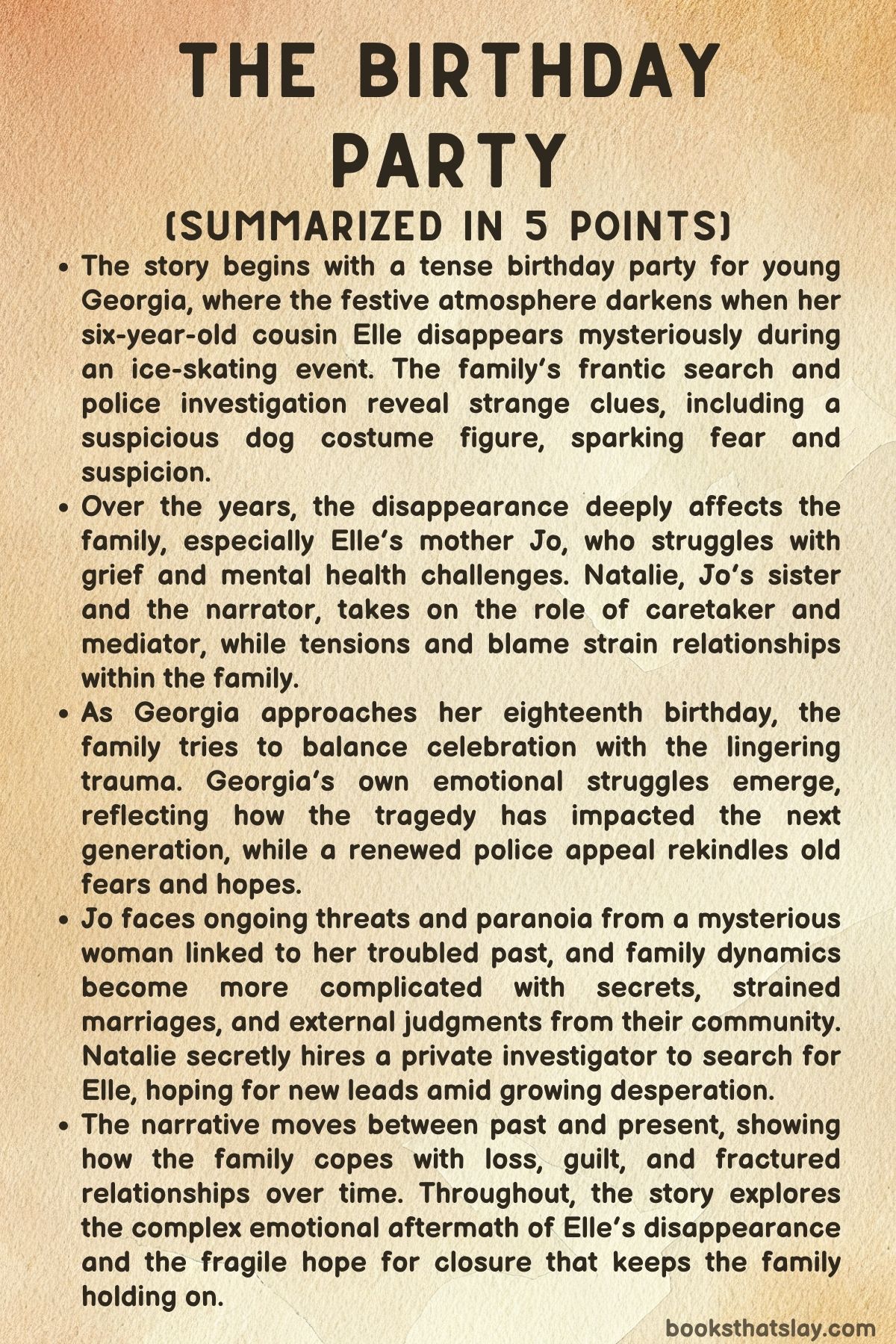The Birthday Party by Shalini Boland Summary, Characters and Themes
The Birthday Party by Shalini Boland is a psychological family drama that centers around the disappearance of a young girl, Elle, at a seemingly innocent ice-skating birthday party. The story unfolds over two timelines: the immediate chaos and trauma of Elle’s vanishing, and the lasting effects on her family nearly a decade later.
At the heart of the narrative is Natalie, a woman balancing the weight of grief, guilt, and hope as she tries to keep her fractured family together. The novel explores the complexities of loss, the emotional fallout of trauma, and the enduring quest for answers and healing amid uncertainty.
Summary
The story begins with a chilling scene where a figure in a cartoon dog costume skates on an ice rink, holding the hand of a young girl who is unaware of any danger. Inside the costume, the person is nervous and sweating, signaling that something ominous is unfolding during what is supposed to be a joyful birthday celebration.
The party is for eight-year-old Georgia, held on an ice rink decorated festively for Christmas, with children skating alongside costumed entertainers.
The mood shifts quickly when Elle, Georgia’s six-year-old cousin, disappears. Elle was last seen skating near the mysterious dog character, who does not appear as part of the official entertainment.
Panic spreads as adults search desperately around the rink, toilets, and nearby areas. The family—especially Georgia’s father Theo and Natalie, Georgia’s aunt—scrambles to find her, trying to keep the other children calm amid growing fear.
Police are called after an hour of fruitless searching. Investigation begins with collecting CCTV footage and eyewitness testimonies, but no trace of Elle emerges.
The dog costume figure becomes the only suspicious lead. As hours turn into days, the family faces intense anxiety, grief, and blame, particularly Natalie who was responsible for Elle at the party.
Jo, Elle’s mother and Natalie’s sister, arrives distraught, and the pressure fractures family relationships. Despite extensive searches involving sniffer dogs, helicopters, and volunteers, Elle remains missing.
Ten years later, the story shifts to Georgia’s eighteenth birthday. The family tries to move forward while carrying the heavy burden of Elle’s disappearance.
Jo continues to struggle emotionally and mentally, isolated and dependent on the support of her sister Natalie and brother-in-law Theo. Natalie manages the party preparations at a trendy cocktail bar, trying to maintain a sense of normalcy despite the lingering trauma.
Police reopen the case with a media campaign and renewed appeals for information, rekindling old fears and painful memories for everyone.
The narrative reveals the personal struggles behind the family’s facade. Jo’s fragile mental state is underscored by reckless behavior and paranoia after being stalked by a mysterious woman.
Georgia battles emotional distress, including self-harm, as she pushes for independence in ways that worry her parents. The family dynamic is tense and strained, with Natalie caught between managing relationships, supporting her daughter, and handling her sister’s instability.
The story also uncovers family fractures beyond Elle’s disappearance. An estranged uncle and his wife maintain distant and insincere connections, reopening old wounds.
Police involvement continues to create tension when Theo is questioned in connection with the ongoing investigation. Throughout, the family is caught between grief, hope, and the desperate search for closure.
In a particularly intense sequence, Natalie receives a panicked voicemail from Georgia, revealing that a strange woman has approached her, threatening to expose secrets. This woman turns out to be connected to Jo’s stalker, escalating fears within the family.
Meanwhile, Jo’s unstable behavior leads to a violent confrontation when the stalker attacks her, further unsettling the family. Jo’s involvement with a man she was unfaithful to adds complexity to Georgia’s emotional burden.
Natalie has secretly hired a private investigator, Tara Stiles, in an effort to find Elle, funding this investigation with a bank loan. The mounting costs and uncertain progress weigh heavily on her, and she hides the truth from Theo.
The private investigation eventually leads to a breakthrough when Tara contacts Natalie with information about a man named Mateo in Gran Canaria, who has a daughter the same age as Elle.
Natalie travels to Spain, where she finds a girl who resembles Jo, confirming the suspicion that Elle is alive and living there. Mateo and his wife Isabel reveal a complicated story: Jo had a brief relationship with Mateo and became pregnant.
Mateo initially abandoned Jo but later sought a relationship with the child. Jo allegedly arranged for Mateo to take custody of Elle in exchange for money, staging an abduction to cover the transfer.
The revelation shocks Natalie, who returns to England to confront Jo. Jo denies orchestrating the arrangement and insists Mateo’s account is false.
The family involves the police to ensure Elle’s safety. Investigations uncover a further betrayal: Ollie, Jo’s longtime friend and romantic interest, colluded with Mateo and helped facilitate Elle’s removal, disguised in the dog costume from the ice rink party.
Ollie’s motivations stemmed from unrequited love for Jo and a misguided belief that removing Elle would bring Jo closer to him.
Ollie’s arrest brings some closure but also deep pain. Over the next several months, the family begins to heal.
Elle remains with Mateo and Isabel in Gran Canaria but starts reconnecting with her birth family, traveling between Spain and England. Jo pursues nursing studies and stabilizes emotionally.
Natalie reflects on the years of heartbreak, secrets, and guilt, recognizing the slow process of forgiveness and recovery.
The epilogue offers insight into Jo’s past—her relationship with Mateo, her pregnancy, and the hardships she faced as a single mother. It explains the reasons behind her silence and the difficult decisions that led to the family’s trauma.
It also reveals Jo’s feelings for Ollie and the complicated history that shaped the events of Elle’s disappearance.
Ultimately, The Birthday Party examines the long-lasting effects of a child’s disappearance on a family’s life. It highlights the emotional struggles, fractured relationships, and the fragile hope that sustains those left behind.
The novel ends on a cautiously optimistic note, showing that while pain and loss remain, the possibility of healing and reconnection endures.

Characters
Natalie
Natalie, the protagonist and narrator of The Birthday Party, is a complex character shaped by years of emotional turmoil and family responsibility. As the sister of Jo and the mother of Georgia, Natalie finds herself caught between caring for her immediate family while grappling with the haunting loss of her niece, Elle.
Throughout the narrative, Natalie emerges as a selfless and protective figure, especially towards Georgia, whose mental health and emotional struggles deeply concern her. Natalie also bears the weight of guilt and responsibility, particularly after Elle’s disappearance.
She feels partly responsible for not being able to prevent it, a burden that remains throughout the years. In addition to her role as a caretaker, Natalie is an event planner by profession, which allows her to bring a sense of order and control in her chaotic life.
Yet, her personal sacrifices, including secretly hiring a private investigator to find Elle, show how deeply she is invested in seeking closure. Despite her tough exterior, Natalie is internally fragile, struggling with her own grief and the complex dynamics within her family.
She also faces tension in her marriage with Theo, who, like her, is emotionally strained by the situation. Overall, Natalie represents the emotional glue holding the family together, even as she battles her own feelings of guilt, frustration, and hope.
Jo
Jo, the mother of the missing Elle, is a character consumed by grief and emotional instability. Her journey throughout The Birthday Party is marked by an ongoing struggle to cope with the trauma of her daughter’s disappearance.
Jo’s life has unraveled since Elle’s abduction, and she has become isolated, relying heavily on Natalie and Theo for support. Her emotional fragility is evident in her impulsive behaviors, such as bringing strangers home late at night and acting recklessly.
Her relationship with Ollie, her longtime friend, also adds to the complexity of her emotional state, as her actions with him and her past mistakes are revealed throughout the story. Despite her struggles, Jo’s love for Elle is never in question, but her inability to deal with the grief of her loss leads her to make questionable choices.
When confronted with the revelation of her role in Elle’s abduction, Jo denies involvement, but her emotional breakdown in the face of the truth is heartbreaking. Jo’s journey is one of deep regret and sorrow, and her healing process is long and fraught with challenges.
Her character arc reflects the complexities of maternal love, loss, and the impact of trauma on an individual’s mental and emotional well-being.
Theo
Theo, Natalie’s husband and Georgia’s father, plays a quieter yet crucial role in The Birthday Party. He is portrayed as a man who is deeply affected by the disappearance of his niece, Elle, but struggles to express his emotions.
While Natalie takes on the role of the family’s emotional caretaker, Theo’s burden is often internalized, which creates a rift between him and Natalie. Their relationship is strained as they cope with the aftermath of Elle’s disappearance, and Theo becomes frustrated with Jo’s dependence on them.
He also bears the weight of guilt and confusion, especially after being questioned by the police about Elle’s case, which brings up painful memories. Theo’s emotional distance and frustration with Jo’s behavior sometimes lead to tension with Natalie, and his struggle to balance his own feelings of helplessness with his duty to his family creates an emotional disconnect.
However, as the story unfolds, Theo’s subtle role as a father who wants to protect his daughter Georgia becomes clear, as he tries to navigate the family dynamics with care and restraint. His complex emotions reflect the silent toll that the unresolved tragedy has taken on the entire family.
Georgia
Georgia, the daughter of Natalie and Theo, is an integral character in The Birthday Party who represents the next generation affected by the trauma of Elle’s disappearance. Although she was young when Elle went missing, Georgia’s life has been deeply shaped by the event.
Now approaching adulthood, Georgia struggles with her mental health, self-harming as a way to cope with her emotions. The weight of her family’s grief and the unresolved mystery of Elle’s fate take a toll on her, as she feels overshadowed by the past and burdened by the trauma.
Despite her parents’ efforts to protect her, Georgia’s desire for independence and her need to live her own life create tension between her and Natalie. Her emotional distress, stemming from both the anniversary of Elle’s disappearance and her own personal struggles, is a central theme in the latter part of the narrative.
Georgia’s character reflects the ripple effects of trauma across generations, showing how unresolved grief can affect even those who were not directly involved in the tragedy. Her relationship with her family is complicated by her mental health issues, and her struggle to find her place in the world amidst such overwhelming emotional baggage makes her one of the most sympathetic and poignant characters in the story.
Ollie
Ollie is a pivotal but tragic character in The Birthday Party, as his unrequited love for Jo leads him to make a devastating choice. As Jo’s longtime friend, Ollie becomes a figure of support for her during the years following Elle’s disappearance.
However, his feelings for Jo go beyond friendship, and he becomes consumed with the hope that helping her might bring them closer together. His actions ultimately lead to the shocking revelation that he played a key role in the abduction of Elle, driven by misguided love and a belief that removing Elle from Jo’s life would allow him to step in.
Ollie’s betrayal is a crushing blow to the family, as his loyalty and long-standing friendship with Jo come into question. His arrest is a turning point in the narrative, exposing the darker sides of his emotions and the toxic nature of his attachment to Jo.
Ollie’s character arc is a tragic commentary on the destructive nature of unrequited love and obsession, and his actions underscore the complexities of human behavior when influenced by unresolved emotional needs.
Mateo and Isabel
Mateo and Isabel, residents of Gran Canaria, emerge as unexpected but significant figures in the story’s later developments. Their connection to Elle (renamed Adela) is central to the shocking revelation that Elle was not abducted by a stranger, but rather involved in a complex, orchestrated plan.
Mateo, a man who had a brief relationship with Jo years ago, plays a critical role in the mystery behind Elle’s disappearance. His story about Jo’s alleged agreement to give up Elle in exchange for money reveals deep layers of betrayal and deceit.
Isabel, Mateo’s wife, supports the claim that they raised Elle as their own, providing her with a privileged life. The discovery of their involvement in Elle’s abduction complicates the emotional landscape of the family, as it raises questions about Jo’s true role in the disappearance.
While their characters are not as deeply explored as the primary family members, Mateo and Isabel’s actions serve as a catalyst for the eventual unravelling of the mystery, and their story adds a layer of complexity to the themes of loss, betrayal, and the search for closure.
Themes
Trauma and Its Lingering Effects
The pervasive presence of trauma in The Birthday Party shapes not only the individual characters but also the family dynamics and their interactions with the world around them. Elle’s disappearance during what was meant to be a joyful celebration becomes a defining moment that casts a long shadow over everyone involved.
This trauma doesn’t simply fade with time; instead, it festers and influences each character’s emotional state and behavior in profound ways. Jo, the mother of the missing child, embodies the raw and persistent pain of loss.
Her struggle with isolation, depression, and erratic behavior highlights how trauma can fracture mental health and destabilize daily functioning. The trauma also reverberates through Natalie and Theo, whose roles expand beyond traditional family duties into caretakers and emotional anchors, bearing the weight of guilt, responsibility, and exhaustion.
Georgia, growing up in the aftermath, internalizes the trauma differently, manifesting signs of emotional distress and self-harm, illustrating how unresolved grief can affect younger generations who may not have directly experienced the triggering event but inherit its psychological burden. The community’s judgment and social media scrutiny add another layer of trauma, turning private pain into public spectacle and deepening the family’s sense of alienation.
Even after ten years, the anniversary of Elle’s disappearance reopens old wounds, showing that trauma is not a static experience but a continuing presence that demands constant negotiation. This enduring trauma shapes the characters’ identities, relationships, and life choices, demonstrating the inescapable nature of loss and the complicated journey toward healing.
Family and the Complexity of Support
Family in The Birthday Party is portrayed as both a source of strength and tension, where loyalty, love, and frustration coexist uneasily. The narrative reveals how a traumatic event can disrupt normal family roles and expectations, forcing members to adapt in unexpected ways.
Natalie’s role extends far beyond that of a sister or aunt; she becomes the linchpin holding together a family unraveling under pressure. Her management of Jo’s emotional instability, her efforts to protect Georgia, and her attempts to maintain a semblance of normalcy during celebrations reveal the exhausting emotional labor families bear in crisis.
Theo, while supportive, experiences his own frustrations and weariness, illustrating that caregiving can strain marital relationships. The tension between Jo and Natalie reflects unresolved guilt and resentment, as both grapple with their own grief and perceptions of responsibility.
The arrival of external family members, like the estranged uncle, brings up past wounds and fractured connections, reminding readers that family support is not always unconditional or reliable. The story also portrays how familial love can become entangled with codependency, especially in Jo’s reliance on Natalie and Theo, which complicates efforts to foster independence and recovery.
The narrative challenges idealized notions of family by exposing its messy realities, where care and conflict intermingle, and where the need for support can sometimes clash with personal boundaries. Despite these struggles, the family’s efforts to maintain ties and celebrate milestones underscore the resilience that family connections can offer in the face of profound adversity.
The Elusiveness of Closure and the Nature of Hope
The theme of closure—or rather, its frustrating absence—permeates The Birthday Party, revealing how unresolved loss can trap people in a liminal emotional space. Elle’s disappearance remains a mystery for most of the story, and this uncertainty becomes a central tension that defines the characters’ experiences.
The police investigations, search efforts, and media appeals offer little in terms of concrete answers, leaving the family suspended between hope and despair. This lack of resolution impacts how each character processes grief; some cling to hope as a means of survival, while others are overwhelmed by the impossibility of moving forward without closure.
The reopening of the case ten years later reignites this complicated mixture of optimism and fear, illustrating that hope is both a sustaining force and a source of vulnerability. The discovery of new leads and the eventual revelation of Elle’s whereabouts introduce a complex dimension to hope—one that involves painful truths, betrayals, and difficult reckonings.
Even as the family begins to rebuild relationships, the story does not offer neat conclusions but instead portrays the ongoing emotional work required to live with uncertainty and partial truths. The narrative highlights how hope must coexist with grief and how closure, when it comes, is often incomplete and nuanced.
This realistic portrayal challenges simplistic ideas about “moving on” and underscores the enduring impact of loss on identity and family cohesion.
The Impact of Secrets and Betrayal
Secrets and betrayal drive much of the tension and emotional conflict in The Birthday Party, demonstrating how hidden truths can corrode trust and exacerbate pain. The family’s history is marked by secrets kept to protect or shield loved ones, but these often create greater harm by breeding suspicion and misunderstanding.
Jo’s concealment of details surrounding Elle’s disappearance, including her relationship with Mateo and the circumstances leading to the staged abduction, introduces layers of complexity to the narrative. This concealment, whether motivated by shame, guilt, or fear, reveals the difficult moral terrain that characters navigate when faced with impossible choices.
Ollie’s betrayal as the orchestrator of Elle’s abduction adds a shocking dimension, illustrating how intimate relationships can be undermined by hidden agendas and misguided intentions. The discovery of these betrayals forces the family to reevaluate their assumptions about loyalty and trust, creating ruptures that must be cautiously repaired.
Secrets also contribute to Jo’s isolation and emotional instability, as her inability or unwillingness to share her struggles with others amplifies her vulnerability. The theme explores how secrecy can be both a defense mechanism and a source of alienation, complicating efforts at reconciliation and healing.
Ultimately, the story portrays betrayal not just as an act of wrongdoing but as a catalyst for painful growth and the eventual rebuilding of fractured relationships, emphasizing the painful necessity of truth in the journey toward healing.
The Struggle for Identity Amidst Loss
The characters in The Birthday Party grapple with defining themselves beyond the trauma that has engulfed their lives. The disappearance of Elle is a pivotal event that reshapes their self-perceptions and life trajectories.
Jo, in particular, struggles to reclaim her identity beyond that of a grieving mother marked by tragedy. Her erratic behavior and attempts to escape reality signify a woman caught between the person she once was and the person she feels forced to become.
Georgia’s transition into adulthood under the shadow of the family trauma highlights the difficulty of forging an independent identity when burdened by inherited grief. Her acts of rebellion and self-harm reflect the inner conflict between a desire for autonomy and the persistent impact of family history.
Natalie’s identity is similarly tied up in caregiving and mediation, blurring the lines between her personal ambitions and familial obligations. The narrative underscores how trauma can inhibit growth and complicate the search for meaning and purpose.
Yet, it also presents moments of tentative self-discovery and resilience, as characters attempt to redefine themselves through new roles, relationships, and hopes. The struggle for identity in the context of loss is portrayed as an ongoing, often painful process, revealing the complexity of human adaptation to profound emotional upheaval.


